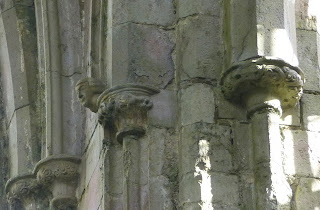The good night of sleep we were so desperately needing didn't really happen for us. Maybe we were just too tired, but after a good Irish breakfast we were ready to begin another day of seeing more of Ireland.
All the B&B's served a full Irish breakfast which consisted of rashers (bacon) soldiers (sausage) 1 egg and a broiled tomato, along with baskets of bread. You also had a choice of cereal, yogurt, fruit, muffins, etc. As we moved further west there was also black and white pudding on some of the menus. More about those later.
Joy's Rockside B&B was just a short walk from the Rock of Cashel, our first planned stop of the day. The Rock was the seat of the Kings of Munster from the 4th or 5th century until it was turned over to the Church in 1101. It served as a religious center until it was sieged by Cromwell's army in 1647. Renovation was being done on the chapel, but a good portion of the complex is still standing.
In all the old churches and abbeys you would see carvings on the pillars and walls, it was astounding to me the amount and quality of the art that was done so many years ago.
St. Patrick's Cross.
The carving on this cross is said to be of St. Patrick who visited Cashel in the year 450. This is the original which is now housed in the museum, a replica is exhibited on the grounds.
Looking at the view from the top of the hill. The pastures are divided by rock or trees and shrubs.
Artifacts from the Rock are exhibited in the museum. The large bell is from the 9th century.
Standing at the top we could see the ruins of Hore Abbey, a 13th century Cistercian foundation.
Driving through one of the towns on our way to Cobh we passed another castle.
This photo shows how the pastures are laid out. We think the trees and bushes dividing the land may be growing over the original rock fences.
Another castle viewed from the road. I believe this is the one that is not open to the public as it is being used as a residence.
The seaside town of Cobh (pronounced Cove) was important in Irish history. Millions of people sailed from here to escape the famine in the 1850's. It was also the last stop for ill-fated Titanic. Just three years later the Lusitania was sunk by a German submarine just off the coast of Cobh.
We learned to not ask where to find a restroom, in Ireland they are simply called "Toilets".
I loved the candy in Ireland (big surprise). Apparently, the Irish like their candy too, there were a lot of Sweet Shops.
Just when I think I have this figured out! This picture is completely out of order, was supposed to be at the end of the post. We ended our day in Blarney at another very nice B&B.
Back to Cobh.....we ate our lunch in a park next to the waterfront.
St. Colman's Cathedral, a church built in the Gothic Revival style.
Cobh was a very picturesque city, one I wouldn't mind visiting again. We drove through the city of Cork and stopped at a shopping center to have a cup of coffee and rest a bit before travelling on to Blarney.













































